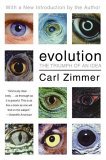 Must the struggle for existence necessarily be a bleak experience? Can we not exult in the wonders produced by natural selection without despairing over "nature red in tooth and claw"? Why do Darwin's own words about the "grandeur in this view of life" invoke a contrary view in so many, that this evolutionary view of life must necessarily lead to nihilism and despair?
Must the struggle for existence necessarily be a bleak experience? Can we not exult in the wonders produced by natural selection without despairing over "nature red in tooth and claw"? Why do Darwin's own words about the "grandeur in this view of life" invoke a contrary view in so many, that this evolutionary view of life must necessarily lead to nihilism and despair?
I've wondered about this for some time now, especially since the Darwin Day discussion panel we hosted on our campus last spring, when the philosopher on the panel brought up the not uncommon view that Darwin somehow displaced morality and left us morally and ethically adrift! And how many in the audience agreed, with even evolutionists on the panel nodding sadly to acknowledge the loss of moral innocence engendered by Darwin. (And I'm apprehensive about the new Darwin biopic "Creation" for it too may be too bleak.)
These questions disturb me again now since last night's performance of "The Origin Cycle " a musical performance of eight selections from "On the Origin of Species" at Stanford University. Let me state first off that I am no music critic (even my iPod listening tends towards spoken word podcasts/books rather than music), and that this particular genre of music is rather outside my normal listening sphere (and don't even ask me what this genre is!). So consider this more a response to the emotions evoked in me by the music, and my subsequent intellectual response to those emotions. I found the concert and performances quite wonderfully evocative - even though our 9-yr-old Darwin fan fell asleep after failing to track the words being sung by the soprano Jane Sheldon; she was still impressed enough to want to meet the musicians and get their autographs on the program! As the friend who invited us to the concert remarked, the compositions were quite complex musically - and appropriately so, I thought, given the subject. So the music did capture the chosen text quite well (I'll share the passages featured later tonight when we return to Fresno), but - and I can't quite put the finger on the role of any particular element in this - I felt the general emotional tone was on the darker side, with melancholy washing over me far more than joy. No wonder then, that the one upbeat composition in the middle, set to a passage about the "Tree of Life" really lifted me up, but all too briefly, before the mood became sombre again. I was hoping for more uplift towards the end, with the final two pieces revolving around Darwin's immortal words about the "Entangled Bank" and the grandeur in this view of life (Floreana) - but those compositions were darker too. The conductor, Jeffrey Means, later told me that "Tree of Life" was the ensemble's favorite too - but I didn't get the chance to ask him about the darkness of the other pieces. So I am left with the sense that the composers of these creative pieces too share a darker view of the meaning of Darwin's work even as they celebrate it. I, for one, would prefer more joy, and more thrill at the sheer intellectual adventure of Darwin, as seen in this week's Nova special on "Darwin's Darkest Hour", which was less dark than the title suggested - but perhaps I should leave that review for a separate post.













0 comments:
Post a Comment